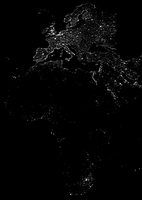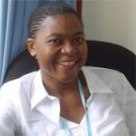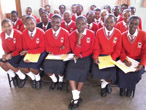 "...Project Baobab achieves its mission by educating and empowering women with skills they will need to start a small business. This includes not only business training but also skills to build their self esteem and confidence. All students, regardless of whether they receive a grant, will be impacted through esteem-building exercises..."
"...Project Baobab achieves its mission by educating and empowering women with skills they will need to start a small business. This includes not only business training but also skills to build their self esteem and confidence. All students, regardless of whether they receive a grant, will be impacted through esteem-building exercises..."
Project Baobab
China & Africa
China’s increasing involvement in Africa should be viewed against this backdrop. Despite the euphonious verbiage about “cooperation”, “equal terms,” and “altruism,” the real intentions of China are threefold. The first is to gain access to Africa’s resources by signing with a bow sweetheart deals with African despots. The second is to canvass for African votes at the United Nations in its quest for global hegemony. In this sense, the Chinese are no different from the French. The third is to seek African land to dump its surplus population. Chinese communes are springing up in Namibia, Zambia, Nigeria and other African countries. The Chinese have succeeded in getting African states to accept large numbers of Chinese experts and workers as part of their investment packages: 28 "Baoding villages" have been established, each housing up to 2,000 Chinese workers, in various parts of Africa. But the Chinese are not the problem.
The real problem was the retinue of clueless African clods, who attended Chopsticks Conference at Beijing in October. “Clueless” because that was no Berlin Conference for sure. No European powers were present; only one Asian power, China. And no Maxim gun was needed. But lying prostrate at China’s feet were 40 African heads of state, offering themselves for voluntary economic enslavement. Disgusting.
Elementary principles of demand and supply suggest that that was a buyer’s market. When 40 desperate suppliers are competing for one buyer’s attention, the buyer calls the shots. With chopsticks dexterity, China can pick platinum from Zimbabwe; oil from Angola, Nigeria and Sudan; cocoa from Ghana; diamonds from Sierra Leone; etc. – all on itsown terms because of its strong bargaining position. Few radical intellectuals and African heads of state see nothing wrong with this
huge imbalance because China is perceived to be a “friend of Africa” since it is “anti-West.”
via R. E. Ekosso
‘Public resources will never be enough’
An FT report on African infrastructure finance states:
Passions run high over all forms of privatisation and private-sector involvement in public utilities. But many experts and officials at international institutions say there is no option between public and private sectors. Infrastructure needs, they argue, will never be met without the resources of both...It has become clear that areas such as transport will continue to depend heavily on injections of public investment and donor support, but public money will have to used in different ways to combine with commercial interests. Mobilisation of capital, including private-sector capital, is one of the “pillars” of the New Partnership for Africa’s Development (Nepad), the economic revival initiative launched five years ago...Africa can also bring to bear its own private savings. South Africa’s Public Investment Corporation, which manages pension funds, is backing a Pan-African Infrastructure Development Fund, aiming initially to raise $1bn for long-term equity investments with participation from other pension funds and the AfDB.
Thanks Pablo!!
Africa Comics
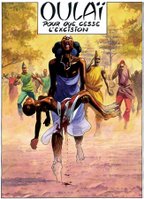 The NYTimes reports on the “Africa Comics” show at the Studio Museum in Harlem which:
The NYTimes reports on the “Africa Comics” show at the Studio Museum in Harlem which:
"...offers an inside view of Africa of a kind we too seldom get from museums, which, when they consider contemporary African material at all, tend to be all-purpose globalist in their thinking, drawing on a snall stock of market-approved figures. The show demands time and effort. The work is physically small and psychologically concentrated; it is as much about reading as looking; the words are often in languages other than English."
image courtesy of Africa e Mediterraneo, Bologna
South-South Investment in Africa
AfricaBeat launches the "South-South Investment in Africa" guide
This is an annotated guide to South-South investment in Africa and its social, economic, and political consequences. Its primary focus is on China in Africa, but it will also take a look at the role of other emerging powers like Brazil and India.
African Voices
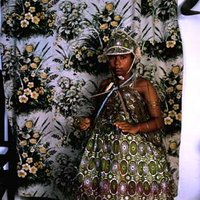 "...African Voices is a permanent exhibition that examines the diversity, dynamism, and global influence of Africa’s peoples and cultures over time in the realms of family, work, community, and the natural environment..."
"...African Voices is a permanent exhibition that examines the diversity, dynamism, and global influence of Africa’s peoples and cultures over time in the realms of family, work, community, and the natural environment..."
via Sociolingo
photo courtesy of the Smithsonian
Infrastructure Financing: Private-Public solutions
 Eric Osiakwan's AfricaCan lauds the alternative financing mechanism proposed for Kenya's National Fiber Network,commenting on a Balancing Act report that states:
Eric Osiakwan's AfricaCan lauds the alternative financing mechanism proposed for Kenya's National Fiber Network,commenting on a Balancing Act report that states:
The Kenya Government will have a 40 per cent holding in the project, Etisalat 20% and the remaining 40% will go to investors in the East African region. The Government has said it will organise an IPO on the Kenyan Stock Exchange. Several Kenyan companies have expressed interest and one said that the Government had told them it would “guarantee their loan”.
He says:
Thank God the Kenyans are experimenting with this approach where government owns part, private sector owns part, educational institutions should also own part, CSO owns part through IPO on the stock market.
The Kenyan government can actually raise the 40% from government bonds . I am not an expert on the stock market discipline of shares or bonds but this is where the financial experts need to come out with innovative solutions that can help raise much of this money locally - it is possible.
The Geanco Foundation
 Continuing our focus on Diaspora foundations we feature the GEANCO Foundation founded by Godwin Onyema,their mission is to:
Continuing our focus on Diaspora foundations we feature the GEANCO Foundation founded by Godwin Onyema,their mission is to:
Design, develop, and manage medical, educational and athletic facilities in Nigeria. The Foundation’s projects will improve health conditions and learning opportunities for Nigerians and will provide opportunities for research, collaboration and cooperation between individuals and groups in the United States and individuals and groups based in Africa for the benefit of all
The ‘Make Africa Wealthy’ campaign
CherryFlava proposes a 'Make Africa Wealthy Campaign' they ask
"How long has the world been feeling sorry for Africa?"
This continent's primary aim must be wealth. Its amazing how all the other problems would disappear if we created enough of our own.
Forget poverty, AIDS, TB, malaria and corruption and lets focus on making Africa stinking rich.
Keep you charity money, we don't need a handout. But we do need your time and creative business ideas.
You want to help Africa - get personally involved.
Advise on our business plans, open your markets, make it easier for us to contribute. Don't give us money because you feel sorry for us. Help us find things that we can sell to you and so make loads of our own money.
Handouts and charity are keeping the problems alive. Why would we stop begging if you keep on giving?
Lets keep our eye on the prize which is really going to make a lasting difference. Make Africa Wealthy - promote education, investment, cheap access to telecommunications and turn your charity money into African venture capital.
If you really do care - you'll stop thinking of Africa as a poor continent and rather as a rising competitor.
via RafiqNet
Electrifying Africa
The journalist John Dvorak is one of the shrewdest observers of the computer scene. In an article for Marketwatch, he manages to both highlight the folly of the so-called $100 laptop and reinforce my view that electricity is the most neglected technology in Africa. Efforts to promote the Web and wider computer usage are well and good, so long as even more energetic efforts are being made to promote access to electricity...“The fact that these people need electricity more than they need a laptop is only part of the problem,” Dvorak quotes me as saying. “The real problem is lost mind share. The [African] people are harmed because these sorts of schemes are sopping up mind-share time of the people who might be doing something actually useful.” The challenge of spreading electricity beyond African elites in cities is a challenge that is both expensive and management-intensive.
Timbuktu's Libraries
 Reuters reports on efforts to preserve the manuscripts of Timbuktu covered earlier:
Reuters reports on efforts to preserve the manuscripts of Timbuktu covered earlier:
Researchers in Timbuktu are fighting to preserve tens of thousands of ancient texts which they say prove Africa had a written history at least as old as the European Renaissance...Written in ornate calligraphy, some were used to teach astrology or mathematics, while others tell tales of social and business life in Timbuktu during its "Golden Age", when it was a seat of learning in the 16th century.
"These manuscripts are about all the fields of human knowledge: law, the sciences, medicine," said Galla Dicko, director of the Ahmed Baba Institute, a library housing 25,000 of the texts.
photo courtesy of reuters
Sierra Leone Network
"...The mission of the Sierra Leone Network is to integrate, complement, foster collaboration, and facilitate coordination among Sierra Leonean charity, and welfare organizations and businesses with the clear aim of promoting economic empowerment and development in Sierra Leone..."
Strengthening Scholarly Publishing in Africa Project
Open Access News reports that:
This project will take the work of AJOL [African Journals Online] to the next level, by assisting those journals that wish to move to online management and publishing of their contents, using subscription and/or open access models in print and/or online editions. Online publication will lead to a far greater circulation and contribution of this scholarship (than the 3,000 documents delivered by photocopy by INASP). This project will also build on INASP’s tradition of delivering publishing workshops in Africa each year, which includes an introduction to Open Journal Systems. This project will form the basis of a new initiative, located in Africa and directed by an African researcher, aimed at helping African research libraries support scholarly publishing, with an eye to supplying AJOL with complete journal contents.
Millenial Challenges for the African Continent
It is the secular that unites, not divides, it is the secular that includes, not excludes, the secular is basically egalitarian, not selective, it is the secular that guarantees equality of space and opportunity between one individual and the next, irrespective of sex, ethnicity or religion even as it guarantees space and protection for the rival faiths that inhabit the nation space. The theocratic urge is, on the contrary, intolerant and stifling. Religion has been responsible for some of the worst civil atrocities that have been perpetrated in my own country, Nigeria, in peace time.
Lady Mechanic Initiative
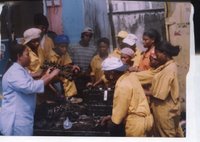 Lady Mechanic Initiative "...is committed to entrepreneurial skill building as panacea for Nigeria and indeed, African development. To this end, we mobilize broad spectrum of the poor and vulnerable people, groups and association, especially people in hard to reach communities to initiate, design and implement programmes that results in sustainable improvement in their well-being as well as facilitates their reintegration into the mainstream society..."
Lady Mechanic Initiative "...is committed to entrepreneurial skill building as panacea for Nigeria and indeed, African development. To this end, we mobilize broad spectrum of the poor and vulnerable people, groups and association, especially people in hard to reach communities to initiate, design and implement programmes that results in sustainable improvement in their well-being as well as facilitates their reintegration into the mainstream society..."
Sweetmother.org

 Founded by Derrick N Ashong SweetMother.org "...recognizes that no society can develop without an understanding of its own worth. We believe that cultural empowerment is a crucial ingredient to the successful political and economic development of any society - for too long the media has portrayed Africa and African people in a light that belies the true beauty and power of our cultures, and has propagated self-destructive and disempowering ideas to Africa's future leaders..."
Founded by Derrick N Ashong SweetMother.org "...recognizes that no society can develop without an understanding of its own worth. We believe that cultural empowerment is a crucial ingredient to the successful political and economic development of any society - for too long the media has portrayed Africa and African people in a light that belies the true beauty and power of our cultures, and has propagated self-destructive and disempowering ideas to Africa's future leaders..."
Life's Second Chance Foundation
 Another foundation of note is the The Life's Second Chance foundation founded by Wossene Tiruneh Bowler it "... was born with a vision of creating a world where people suffering from cancer get the best medical help and attention. By establishing hospitals and research centers, patients can be treated with dignity, comfort and hope..."
Another foundation of note is the The Life's Second Chance foundation founded by Wossene Tiruneh Bowler it "... was born with a vision of creating a world where people suffering from cancer get the best medical help and attention. By establishing hospitals and research centers, patients can be treated with dignity, comfort and hope..."
via Ethioblog
The Sustainable Village- Songhai Center
 John Matshikiza wrote about the Songhai Center covered earlier on Timbuktu Chronicles:
John Matshikiza wrote about the Songhai Center covered earlier on Timbuktu Chronicles:
Godfrey Nzamujo’s guiding principle was: “The only way to fight poverty is to transform the poor person into an active producer.” His way of doing this was to create a living and teaching environment where ordinary Africans could learn the skills of self-advancement. There, thoroughly applying all he had learned over the years about mechanical and electronic engineering, farming, economics, business, and husbandry in general (spiritual and temporal) he set about turning his vast, abstract knowledge into something practical.
Zero Sum Politics
Clientelism is central to neo-patrimonialism, with widespread networks of clients receiving services and resources in return for support. This relationship may be likened at the highest (presidential) level to that of a father and his children whereby political legitimacy rests on the idea that government stands in the same relationship to its citizens as a father does to his children. Essentially, the father serves as the nurturer, teacher, and most importantly, provider to the nation and in return he receives love and support from his children. It is when he can no longer perform this function that the system starts to fall apart.
Crucially, resources extracted from the state are deployed as the means to maintain support and legitimacy in this system, with the effect that the control of the state is equivalent to the control of resources, which in turn is crucial for remaining a Big Man. That is what lies at the heart of the profound reluctance by African presidents to hand over power voluntarily and why almost all African regimes end in controversial circumstances. In most cases the democratic option is either absent or is not respected by the loser; the stakes simply are too high, as once one is out of the loop regarding access to state resources, the continuation of one's status as a Big Man becomes virtually impossible. Politics in Africa thus tends to be a zero-sum game.
via Foreign Policy In Focus
Market-Based Strategies
Alex Steffen reports on Market-Based Strategies that Benefit Low-Income Communities. It lays out"...various challenges ("poor understanding of the human and social capitals of low income communities") and various approaches ("design products and services that tap into the wealth of poor"), it showcases nine solutions that seem to be working (such as, in this case, the solution of "acquiring technology through micro-leasing (pdf)..."
Regional integration
For Africa to succeed economically, Birdsall(director of the Center for Development Economics) suggests, nations need to trade with each other more, creating larger, more attractive markets and reaping economies of scale. It makes very little sense for each state in Africa to build their own garment industry… and even less sense for each country to protect their industry against their neighbors with tariff barriers - if trade between countries was easier and cheaper, nations could specialize in sectors of the economy, begin trading to neighboring states, then grow and trade with the wider world. But at present, Sub-Saharan African nations levy tariffs on average of 17% on trade with each other; OECD nations have dropped these tariffs to an average of under 4%.
Africans And Victimhood
I think a lack of dignity in adversity does not help our case. It causes us to lose credibility.I am not saying that noble abnegation and a quite acceptance of suffering are the right attitude. I do not aspire to sainthood, especially on behalf of other people. But we need to get out of this whining routine.
Things were done to us, true. We should remember them so that
1)We can recognise and fight them if any attempt is made to repeat them,
2)We will know why we are the world’s unwashed armpit, and
3)We can assess honestly where we went wrong.
Yes, we did do wrong. Though we did not invite the evils, and our own faults do not necessarily justify the evils being committed, our inability to counter these evils is also based on failures on our part. Did our chiefs not sell rivals and prisoners of war into slavery? Did we ourselves not own slaves? Do we not treat our women in much the same way as more powerful nations treat us?
via Global Voices
Beyond Aid
Increasingly we must realise that aid is not the answer -- or at least not all of the answer. There is no argument for immediate self-sufficiency. Not for the hungry people of Zimbabwe. Not for the displaced people of Darfur. Aid for humanitarian purposes is and will be necessary in Africa for the foreseeable future. But securing stability and sustainable wellbeing must come through other means.
What might those be? Fair trade and debt relief offer a far more sustainable path towards security and development...This will require much better terms of trade...If the barriers to entry into wealthy markets are lowered, investment could increase and employment could grow...In addition, our continent needs to harness its diaspora as India has done...Remittances should be leveraged: every year a whopping $100-billion is transferred by migrants to their home countries. In some areas, these remittances are paying a development dividend.
via YaleGlobal
Celebrating miserable African leaders
Dennis Matanda at the Sub-Saharan African roundtable comments on the Mo Ibrahim prize:
In a classic case of “African solutions for African problems,” Mohammed “Mo” Ibrahim, a successful London-based Sudanese entrepreneur and multimillionaire with more than $ 500 million to his name - he owned Celtel in Uganda until last year - is offering present and future African leaders the richest annual prize in the world. Announced on October 25, 2006 in London, the prize challenges African heads of state to govern and lead their people properly, which is where the Professor Rotberg index will come in...I agree that there is need to reward honesty, but to reward an African leader to do his job is like pouring milk on a fire when you can use water!
via GlobalVoices
Engineering Education
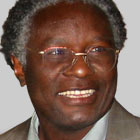 Calestous Juma makes a case for strenghthening engineering education he
Calestous Juma makes a case for strenghthening engineering education he
"...argues for more engineering academies to engage young engineers and practitioners and generate innovative solutions to sustainable development. Africa has 12 national science academies, as well as a continental one, but only one engineering academy,Nationmedia.
via Scidev and TheGuardian
photo courtesy of the Guardian







